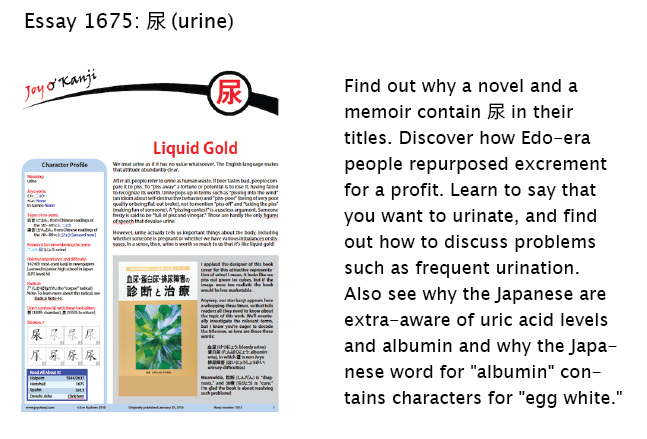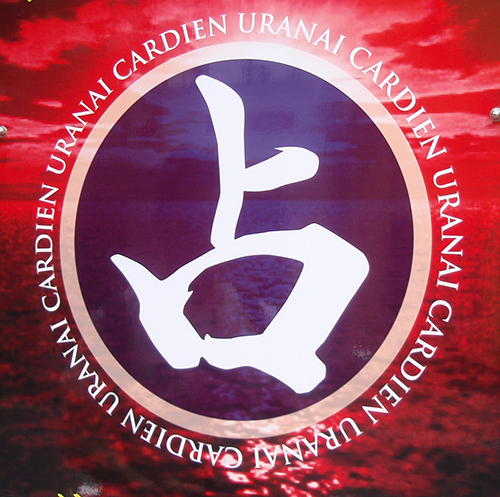Reverse Divination
What do you think the following sentence might mean:
彼らは、全人口の約1パーセントを占めている。
It really comes down to what the red keyword represents. Here are your choices:
a. About 1 percent of people have their fortunes told.
b. About 1 percent of people can tell fortunes.
c. They make up about 1 percent of the total population.
d. They, the Occupy movement, are the 1 percent.
I'll block the answer with a preview of the newest essay:

c. Here's the sentence again, now with annotations:
彼らは、全人口の約1パーセントを占めている。
They make up about 1 percent of the total population.
彼ら (かれら: they); 全人口 (ぜんじんこう: total population); 約 (やく: about)
As for the keyword, that's the shocker, at least for me. I associate the very cute 占 kanji primarily with fortune telling. In that capacity, it has the Joyo kun-yomi of 占う (うらなう: to tell a fortune, forecast, predict, divine), as in this picture:

Photo Credit: Eve Kushner
In this sign from the Shinjuku section of Tokyo, the large 占 means “fortune telling” (占い, うらない).
But 占 also has another Joyo kun-yomi:
占める (しめる: (1) to occupy; hold; (2) account for; make up; take up)
In the sample sentence we've examined, this verb means "to make up":
彼らは、全人口の約1パーセントを占めている。
They make up about 1 percent of the total population.
As you can see above, "to make up" is a secondary definition of 占める, whereas "to occupy" is the primary one. I suppose "to make up" in this sense isn't that far from "to occupy." Take, for instance, this sentence:
時には読書が彼の時間の半分を占めた。
Sometimes reading took up half his time.
時に (ときに: sometimes); 読書 (どくしょ: reading); 彼 (かれ: he); 時間 (じかん: time); 半分 (はんぶん: half)
Reading "took up" or "made up" half his time, which is to say that it "occupied" half his time.
The correlation is even clearer in this example:
陸地が地表に占める面積は、海洋よりも小さい。
Land occupies less of Earth's surface than the ocean does.
陸地 (りくち: land); 地表 (ちひょう: Earth's surface); 面積 (めんせき: area); 海洋 (かいよう: ocean); 小さい (ちいさい: small)
If land "occupies" part of Earth's surface, that land "makes up" part of the planet's surface.
It's funny to me that land could occupy anything, as it's usually people who occupy land (and countries). But the more I think about it, the more it makes sense to me that "occupy" and "make up" have a connection. Consider this sentence:
日本の養殖真珠は世界の真珠市場の6割を占めるまでになった。
Japanese cultured pearls have come to monopolize as much as 60 percent of the world pearl market.
日本 (にほん: Japan); 養殖真珠 (ようしょくしんじゅ: cultured pearl); 世界 (せかい: world); 真珠 (しんじゅ: pearl); 市場 (しじょう: market); 6割 (ろくわり: 60 percent)
The pearls occupy a space in that market. They take up that space. They make up that market share. It's all interchangeable.
Perhaps the more important question is how 占 developed a connection with "to occupy; make up" on the one hand and "fortune telling" on the other.
Henshall says "fortune telling" was the primary sense of this character. In his etymology, the bottom part, 口, represents "to say," whereas the top is a variant of ト, "divination." He adds that 占 symbolizes "that which is said by a diviner"—namely, a "prediction."
As to how the upper shape can carry such a weighty meaning, Henshall explains that point in his etymology of 外 (91: outside). Noting that people once did divination with turtle shells, he says the right side of 外 shows a crack in such a shell. Also, the タ phonetically expresses "to split open" and lends its crescent shape to suggest "turtle shell," but I'm far more interested in the ト. Because cracks generally appeared on the outside of turtle shells, 外 came to mean "outside" or "outer." So cool!
Kanjigen differs slightly on the etymology: The 口 at the bottom represents a thing or place. Again, the 卜 alone means “fortune telling." The complete shape 占 means “to pick and determine a thing or place by fortune telling.”
The same source also says that "fortune telling" was the primary meaning of 占. Before occupying something, one needs to determine what to occupy. Thus, 占 later came to mean “to occupy." Ah, that's how the two definitions connect!
On another note, I've just realized that the sample sentence about pearls (which I found in Breen's dictionary) appeared in essay 1349 on 珠 (pearl; gem; bead). That came out in October 2013. I've therefore "known" for more than two years that 占める can mean "to occupy" and "to make up." Funny how it's all brand-new to me now. When it comes to kanji discoveries, I tend to experience reverse divination. That is, rather than enjoying glimpses of the future, I often have insights about what has happened in the past and then been whisked away by forgetfulness!
Have a great weekend!

Comments